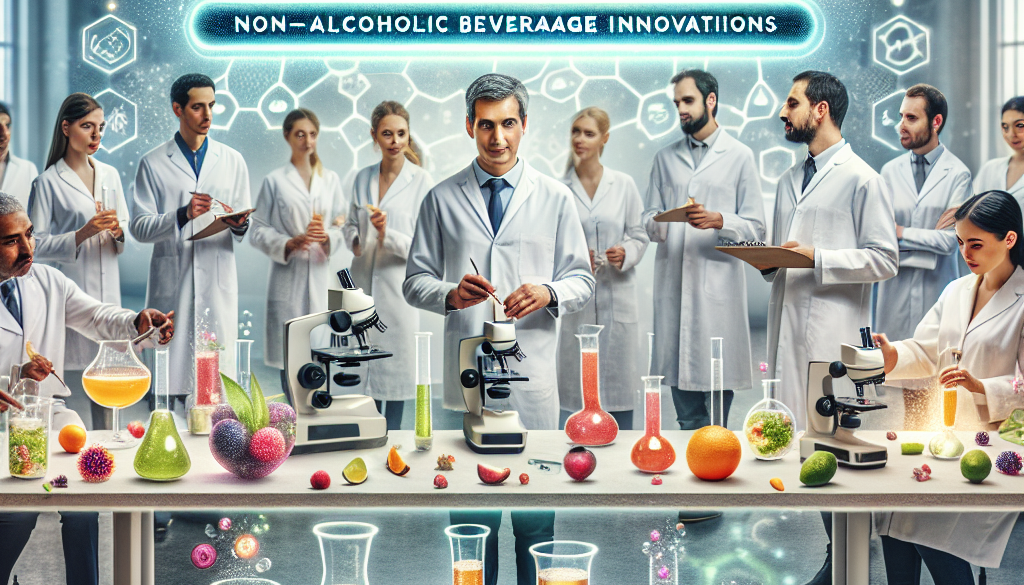Crafting the Future: Non-Alcoholic Beverage Innovations
-
Table of Contents
- Non-Alcoholic Beverage Innovations: Shaping the Future of Drinks
- The Rise of Non-Alcoholic Beverages
- Innovative Ingredients and Flavors
- Technological Advancements in Production
- Case Studies: Pioneers in Non-Alcoholic Innovation
- Consumer Engagement and Marketing Strategies
- Statistics and Market Growth
- Conclusion: The Future is Bright for Non-Alcoholic Beverages
- ETprotein: Enhancing Non-Alcoholic Beverages with Quality Proteins
Non-Alcoholic Beverage Innovations: Shaping the Future of Drinks

The beverage industry is undergoing a transformation as consumer preferences shift towards healthier and more sustainable options. Non-alcoholic beverages are at the forefront of this change, with innovations that are not only challenging traditional drinking cultures but also offering exciting alternatives for those looking to reduce or eliminate alcohol consumption. This article explores the latest trends and breakthroughs in non-alcoholic beverage innovations, providing insights into how they are crafting the future of the drinks industry.
The Rise of Non-Alcoholic Beverages
Non-alcoholic beverages have seen a surge in popularity in recent years. This trend is driven by a variety of factors, including health consciousness, lifestyle choices, and a growing interest in unique and complex flavors. The market for non-alcoholic drinks is expanding rapidly, with a projected compound annual growth rate (CAGR) of 7.1% from 2021 to 2028, according to Grand View Research.
Innovative Ingredients and Flavors
One of the key areas of innovation in non-alcoholic beverages is the use of novel ingredients and flavors. Manufacturers are experimenting with a range of botanicals, herbs, spices, and even adaptogens to create sophisticated and adult-oriented drinks. These ingredients not only provide unique tastes but also offer potential health benefits, appealing to consumers who are mindful of what they consume.
- Botanical infusions: Drinks infused with botanicals like lavender, rosemary, and hibiscus offer a complex flavor profile and are often marketed as a premium product.
- Adaptogenic drinks: Beverages that contain adaptogens such as ashwagandha and holy basil are believed to help the body resist stressors, making them popular among wellness-focused consumers.
- Functional beverages: Drinks that include added vitamins, minerals, and other nutrients cater to health-conscious individuals looking for more than just hydration.
Technological Advancements in Production
Technology plays a significant role in the development of non-alcoholic beverages. Advances in production processes have enabled manufacturers to replicate the complexity and mouthfeel of alcoholic drinks without the alcohol content. For example, vacuum distillation and reverse osmosis are techniques used to remove alcohol from beer and wine while preserving their original flavors.
Case Studies: Pioneers in Non-Alcoholic Innovation
Several brands have emerged as leaders in the non-alcoholic beverage space, showcasing the potential for growth and creativity in the industry.
- Seedlip: The world’s first distilled non-alcoholic spirit, Seedlip offers a sophisticated alternative to traditional spirits, with complex flavors derived from botanicals.
- Heineken 0.0: Heineken’s non-alcoholic beer has gained popularity for its taste that closely resembles its alcoholic counterpart, thanks to innovative brewing techniques.
- Kin Euphorics: A brand that specializes in non-alcoholic beverages with adaptogens and nootropics, Kin Euphorics targets consumers interested in mood-enhancing effects.
Consumer Engagement and Marketing Strategies
Marketing plays a crucial role in the success of non-alcoholic beverages. Brands are engaging with consumers through storytelling, emphasizing the craftsmanship and quality of their products. Social media campaigns, influencer partnerships, and experiential events are some of the strategies used to build a loyal customer base and create a sense of community around non-alcoholic drink options.
Statistics and Market Growth
The non-alcoholic beverage market is not just a passing trend; it’s a growing segment with significant potential. According to a report by IWSR Drinks Market Analysis, the non-alcoholic beverage sector in the United States grew by around 30% in volume in 2020. This growth is indicative of a broader shift in consumer behavior and represents a substantial opportunity for innovation and investment.
Conclusion: The Future is Bright for Non-Alcoholic Beverages
The non-alcoholic beverage industry is poised for continued growth as consumers increasingly seek out healthier and more diverse drink options. Innovations in ingredients, flavors, and production technologies are driving this sector forward, offering exciting opportunities for both new startups and established brands. As the market evolves, we can expect to see even more creative and satisfying non-alcoholic beverages that cater to a wide range of tastes and preferences.
ETprotein: Enhancing Non-Alcoholic Beverages with Quality Proteins
In the realm of non-alcoholic beverage innovation, protein-enriched drinks are gaining traction. ETprotein is at the forefront of this trend, offering a variety of high-quality protein products that can enhance the nutritional profile of non-alcoholic beverages. Their organic and clear protein options are ideal for creating smooth, nutritious drinks that meet the demands of health-conscious consumers.
ETprotein’s offerings are not only nutrient-dense but also cater to those with dietary restrictions, being non-GMO and allergen-free. Their proteins can be seamlessly integrated into a range of non-alcoholic beverages, from protein-packed smoothies to functional sports drinks, providing both flavor and nourishment.
For beverage manufacturers looking to tap into the growing market of protein-enriched non-alcoholic drinks, ETprotein’s products present a valuable opportunity. With their commitment to quality and versatility, ETprotein is helping shape the future of the beverage industry.
About ETprotein:
ETprotein, a reputable protein and L-(+)-Ergothioneine (EGT) Chinese factory manufacturer and supplier, is renowned for producing, stocking, exporting, and delivering the highest quality organic bulk vegan proteins and L-(+)-Ergothioneine. They include Organic rice protein, clear rice protein, pea protein, clear pea protein, watermelon seed protein, pumpkin seed protein, sunflower seed protein, mung bean protein, peanut protein, and L-(+)-Ergothioneine EGT Pharmaceutical grade, L-(+)-Ergothioneine EGT food grade, L-(+)-Ergothioneine EGT cosmetic grade, L-(+)-Ergothioneine EGT reference grade and L-(+)-Ergothioneine EGT standard. Their offerings, characterized by a neutral taste, non-GMO, allergen-free attributes, with L-(+)-Ergothioneine purity over 98%, 99%, cater to a diverse range of industries. They serve nutraceutical, pharmaceutical, cosmeceutical, veterinary, as well as food and beverage finished product distributors, traders, and manufacturers across Europe, USA, Canada, Australia, Thailand, Japan, Korea, Brazil, and Chile, among others.
ETprotein specialization includes exporting and delivering tailor-made protein powder and finished nutritional supplements. Their extensive product range covers sectors like Food and Beverage, Sports Nutrition, Weight Management, Dietary Supplements, Health and Wellness Products, and Infant Formula, ensuring comprehensive solutions to meet all your protein needs.
As a trusted company by leading global food and beverage brands and Fortune 500 companies, ETprotein reinforces China’s reputation in the global arena. For more information or to sample their products, please contact them and email sales(at)ETprotein.com today.














